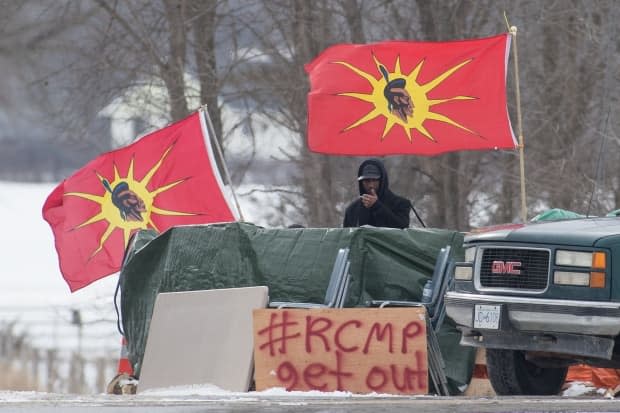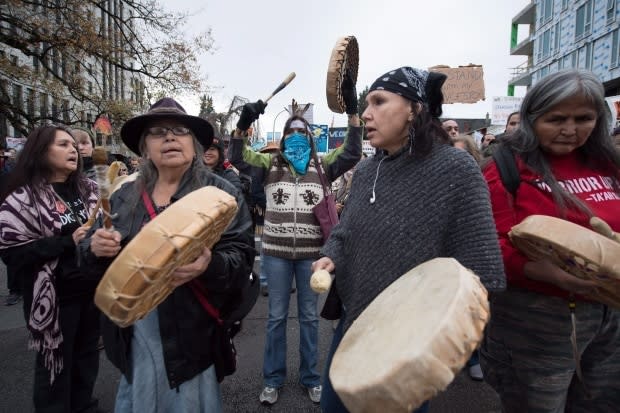Government asking for an extra $2.1 billion for Indigenous programs
Prime Minister Justin Trudeau's government is asking Parliament to spend an additional $2.1 billion on Indigenous programs and initiatives, above and beyond what MPs already have approved.
While $2 billion of the proposed spending for Indigenous services would be new money, supplementary estimates tabled in Parliament show that more than $53 million in net transfers from various departments would go to a wide range of Indigenous programs and projects.
Among other things, the government is proposing an additional $52.9 million for the RCMP for First Nations Community Policing Services and $1.2 million for Library and Archives Canada to help it preserve Indigenous culture and language recordings.
Overall, roughly 53 per cent of $3.8 billion in new money the government is asking MPs to approve would go to initiatives involving Indigenous communities.
The tabling of the supplementary estimates comes as tensions are running high over Indigenous-led rail blockades that have crippled Canada's freight network.
Mohawk protesters near Belleville have vowed to maintain their blockade until the RCMP leaves territory in northern British Columbia where Wet'suwet'en hereditary chiefs have been fighting the construction of a natural gas pipeline.

The spending Parliament is being asked to authorize is in keeping with the Liberal government's commitment to reconciliation with Indigenous communities and promises it made in its last budget.
"It is a continuation of what we've been doing since Day 1," Finance Minister Bill Morneau told reporters when he tabled his 2019 budget last March. "It is driven by the fact that we know, in this country, we need to get this right. We've got a lot of work to do and we are going to stay on it."
One of the bigger items in the supplementary estimates would forgive $919 million in debt that Indigenous groups across Canada accumulated while they participated in comprehensive land claims negotiations.
The government announced in its budget last year that it would repay or forgive $1.4 billion in loans the government gave Indigenous communities — many of them in British Columbia — to allow them to participate in land claims negotiations.
The supplementary estimates provide for an additional $588.3 million to be spent on children and family services, while another $232 million would fund health, social and education services for First Nations children in keeping with the Jordan's Principle policy.
The policy is named after Jordan River Anderson, a First Nations boy from Manitoba who died following a dispute between the federal and provincial governments over which level of government should pay for his care.
The Department of Indigenous Services is to receive $150 million for emergency management service providers on reserves across Canada, while $18.1 million has been earmarked to strengthen environmental protections and address the concerns raised by Indigenous groups about the Trans Mountain Expansion project.

Conservative Treasury Board Critic Tim Uppal said his party will work to make sure the money being spent makes a difference.
"Canada's Conservatives have long advocated for the federal Liberal government to take more steps to ensure Indigenous peoples across the country are able to more fully participate in Canada's economy," he wrote in a statement. "We will continue to use our strengthened opposition to ensure that any new funding for Indigenous programs, projects and initiatives is used to make real and measurable improvements."
NDP MP Gord Johns (Courtenay-Alberni) welcomed the proposed new spending, saying the money to forgive land claims negotiation loans will be particularly helpful.
"It's going to take an enormous amount of pressure off of the Indigenous communities that had been carrying an enormous amount of debt with the government of Canada," he said. "It's going to relieve a lot of pressure so they can invest in important things in their communities, especially their youth."
But Johns said the government has to do more.
"There is systemic racism in their policies and chronic underfunding and this needs to be addressed," he said.
Johns dismissed the suggestion that a call for billions of dollars in new spending on Indigenous programs and initiatives in the midst of the blockade crisis could itself trigger a controversy.
"I think the only thing that's controversial is that they're still fighting Indigenous children in court. They haven't addressed the outstanding issues that are there," he said.
"There are Indigenous people that are living in squalor conditions, in poverty. They haven't even got a plan for Indigenous housing ... [for] people that are living in urban, rural and northern communities."
Some of the other spending items the government is asking Parliament to approve:
$487.3 million for the Department of National Defence for military equipment, physical infrastructure and information management and technology systems under its Strong, Secure, Engaged program.
$128.5 million for the Department of National Defence for its land task force in Latvia, an air task force for patrol and training and naval vessels to work with NATO partners.
$180.4 million to write off student loans that the government hasn't been able to collect — something it does periodically.
$1.6 million to implement the new system of record suspensions for simple possession of cannabis convictions.
$5.3 million to reduce plastics pollution.
Elizabeth Thompson can be reached at elizabeth.thompson@cbc.ca


